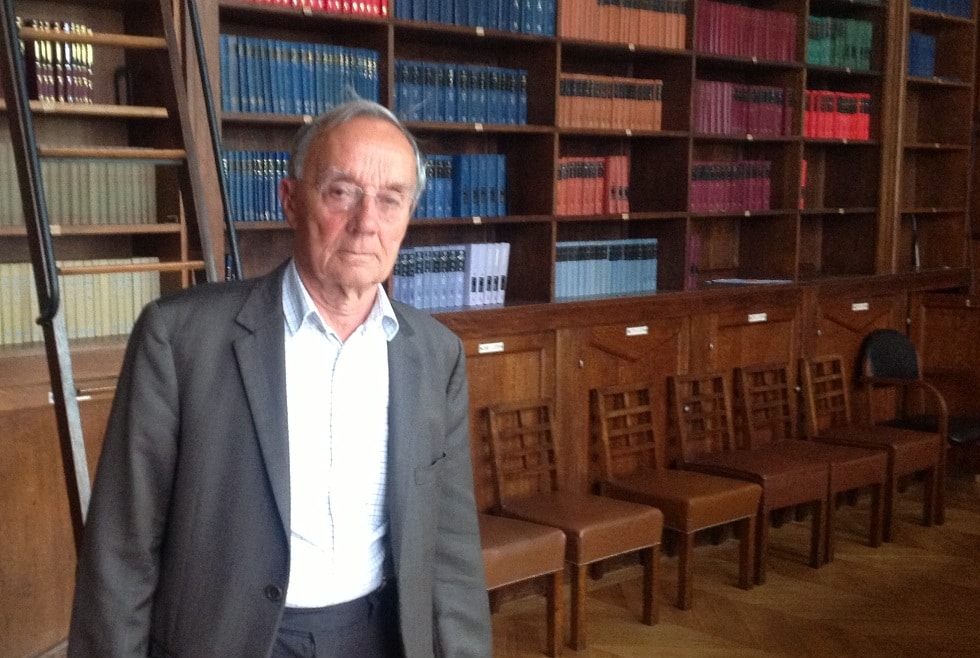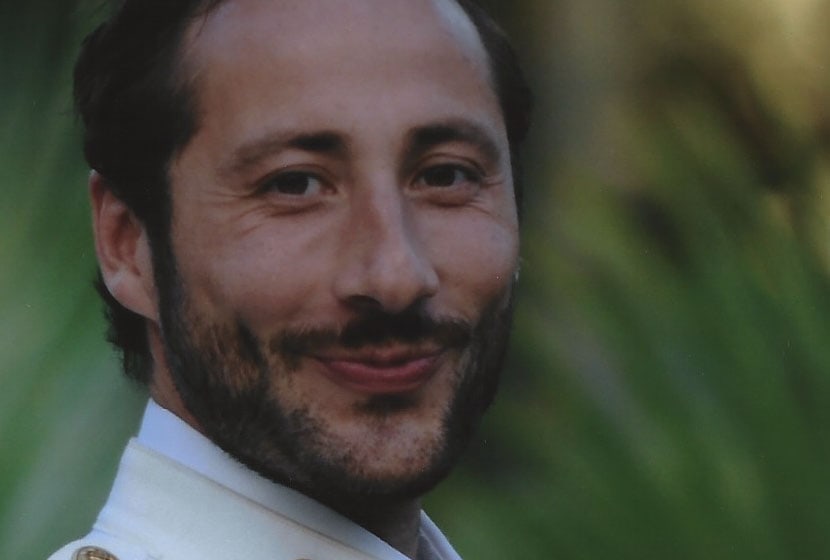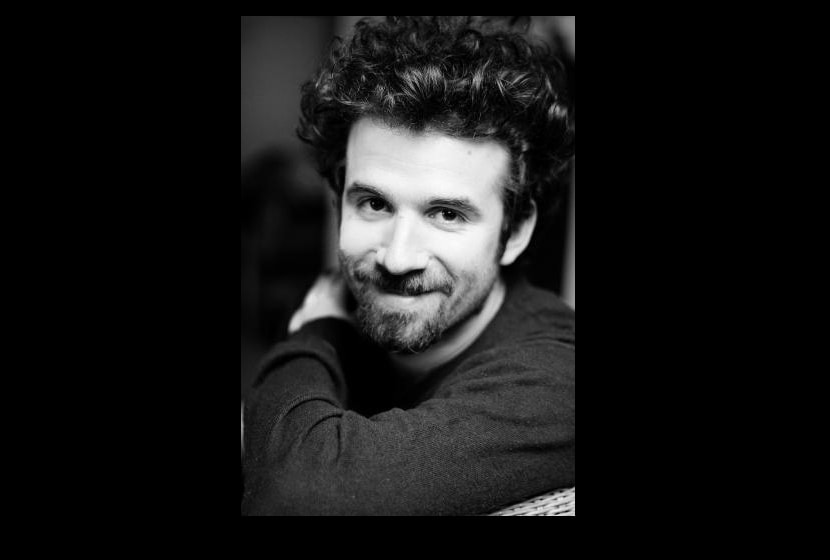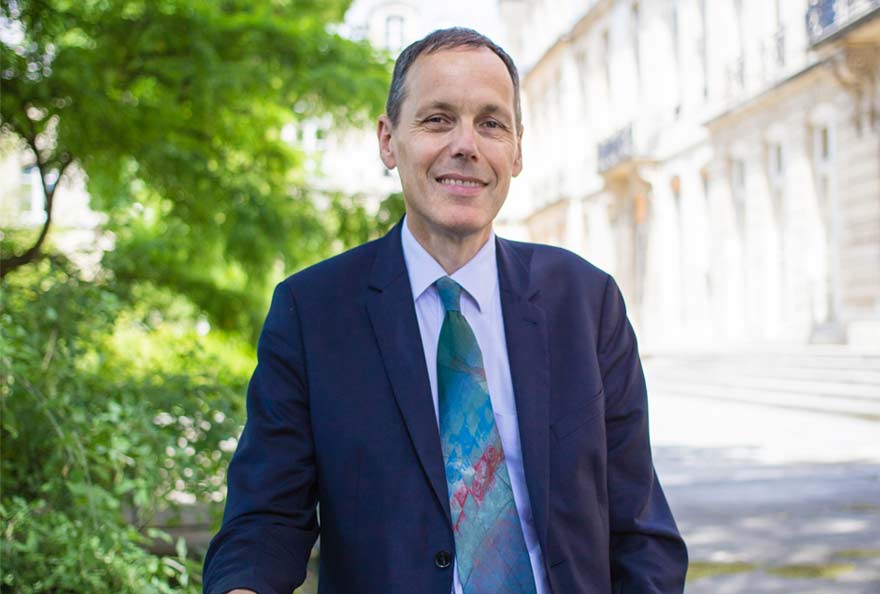It is in the prestigious setting of the Institute of Physico-chemical Biology that Professor Pierre Joliot received UP' Magazine for an exclusive interview. A small office looking more like a monk's cell, filled with a jumble of books and files and the famous white board covered with numbers, complex and mysterious formulas; the Rue d'Ulm district in Paris, a concentrate of intelligence, ethics of fundamental research. An open-ended conversation about innovation.
Just like Serge HarocheProfessor Joliot, the new 2012 Nobel Prize winner in physics, who believes that "research is not justified by its economic benefits", believes that research is a mark of culture and civilization, as noble as art. This is why a government should promote fundamental research. Not to discourage the enthusiasm of young researchers by "miserable" material conditions. And put a lot of money into training. This is a priority task which, at a time when "a worrying anti-scientific spirit" is developing, makes teachers "the custodians, much more than bankers, of a country's wealth". (Source: Le Monde.fr /Pierre Le Hir - 9 oct 2012)
|
Pierre Joliot: a career in the service of knowledge "To be original and creative, you have to be a little ignorant". Professor Pierre Joliot Pierre Joliot, son of Frédéric and Irène Joliot-Curie, both winners of the Nobel Prize in Chemistry in 1935 and grandson of Pierre and Marie Curie, began his career at PCPI in 1953 at the age of 21. As Director, he had a brilliant career there: a researcher since 1956, he became Director of Research at the CNRS in 1974. He specialized in biology and, among other things, was Director of the Biology Department of the École normale supérieure from 1987 to 1992, before chairing the Scientific Council of the École normale supérieure de Lyon. An honorary professor at the Collège de France, former holder of the chair of cellular bioenergetics and member of the American National Academy of Sciences, his career has been marked by success. For example, he was awarded the Prix du Commissariat à l'Énergie Atomique in 1980 and the CNRS Gold Medal in 1982. He has also been a Commander of the National Order of Merit and the Legion of Honour since June 19, 2001. He is promoted Grand Officer of the Legion of Honour on July 13, 2012. Pierre Joliot is now a professor at the Collège de France and a member of the French and American Academies of Science. (Source: Wikipedia) Now retired, he continues his research work and considers himself considerably younger and freer. |
![]() UP: Research does not always lead to innovation. So what is an innovation for a scientist like you?
UP: Research does not always lead to innovation. So what is an innovation for a scientist like you?
PJ There are many definitions of the word innovation. For example, a discovery in basic research may very well be called an innovation. For me, innovation is when the progress of knowledge and the progress of applied research lead to applications that are useful to citizens. Upstream of an innovation as I define it, there is a long process involving a body of research knowledge or basic research, applied research and finally development research. Each stage is necessary, but requires both time and the implementation of very different means.
![]() Is innovation in danger today?
Is innovation in danger today?
In a society obsessed with the short term, the tendency is to condense innovation into a single phase, which seems to me to be absurd and may even condemn it. Going too fast leads to a sterilisation of the notion of innovation.
![]() Does research serve innovation? What is its role?
Does research serve innovation? What is its role?
 Most scientists consider basic research - the search for knowledge - to be research and an indispensable step in the innovation process. Jacques MonodI had long discussions with him on this subject and he considered that the only justification for seeking knowledge was a cultural interest. The sole purpose of the researcher is to improve our knowledge and understanding of the world and therefore there is no other justification to be given. Personally, I accept this definition but I note that, for operational reasons, all major technological advances in all fields (health, technology,...) are the result of an advance in knowledge whose application possibilities are impossible to predict.
Most scientists consider basic research - the search for knowledge - to be research and an indispensable step in the innovation process. Jacques MonodI had long discussions with him on this subject and he considered that the only justification for seeking knowledge was a cultural interest. The sole purpose of the researcher is to improve our knowledge and understanding of the world and therefore there is no other justification to be given. Personally, I accept this definition but I note that, for operational reasons, all major technological advances in all fields (health, technology,...) are the result of an advance in knowledge whose application possibilities are impossible to predict.
When Max Planck was interested in the study of the changes in colour that a piece of metal undergoes as a function of temperature, this was an academic subject, with no application prospects. He could not foresee that this research would lead him to demonstrate that energy was distributed in a quantified way. He had no idea of the revolutions that this discovery would bring. Nothing that characterizes the modern world, computer science, electronics or electrical engineering would be possible without this discovery.
 Another example, my parents, Frédéric and Irène Joliot-Curie discovered artificial radioactivity, a discovery that has had a major impact on the progress of biology and many other areas of science. It is clear that when my parents conducted this experiment, they had no idea of the practical consequences that could result. They realized that they had made a radioactive atom with the same chemical properties as atoms found in nature. This atom incorporated into a molecule of biological interest can make it possible to follow the fate of this molecule inside a cell or a living being. The consequences of this discovery, which has had a considerable number of applications in fields other than physics, were completely unpredictable.
Another example, my parents, Frédéric and Irène Joliot-Curie discovered artificial radioactivity, a discovery that has had a major impact on the progress of biology and many other areas of science. It is clear that when my parents conducted this experiment, they had no idea of the practical consequences that could result. They realized that they had made a radioactive atom with the same chemical properties as atoms found in nature. This atom incorporated into a molecule of biological interest can make it possible to follow the fate of this molecule inside a cell or a living being. The consequences of this discovery, which has had a considerable number of applications in fields other than physics, were completely unpredictable.
A search for knowledge is therefore necessary, in the spirit of Jacques Monod, but, from the point of view of the citizen who is concerned to know why he or she should finance this type of research, it must be stressed that any progress in knowledge is potentially likely to lead to innovations that are useful to man.
![]() You said "the researcher must be an opportunist when faced with unexpected facts that may lead to a great discovery".
You said "the researcher must be an opportunist when faced with unexpected facts that may lead to a great discovery".
This seems to me to be fundamental, but it is becoming increasingly difficult in the context of the short-term ideology that currently dominates our societies. We try to orient the work of researchers on subjects that we assume will be applied quickly and we ask them to include their research project in a program. Like most researchers, I often have ideas that I think are "great", I test them and most of the time my "great" idea is not confirmed by experience. On the other hand, starting from a theory, even a false one, makes it possible to build a well-conceived experiment that can lead to an unexpected and baroque result. Most often, this result is the consequence of an experimental error and therefore of no interest; but, on rare occasions, it can be the cause of a discovery. Great researchers are those who know how to take advantage of the opportunity offered to them by reorienting their work according to these unexpected results. In other words, researchers protect themselves against what is too new. And as my hon. colleague says, André Verméglio, « ois never safe from discovery." that forces us to get out of our preconceptions. We must have the courage to be greedy for anything that has not been planned or scheduled.
![]() In the word innovation, there is the word "new". Is it new in relation to the state of the art, or is it new in relation to uses, modes of behaviour, or the acceptance that individuals make of it?
In the word innovation, there is the word "new". Is it new in relation to the state of the art, or is it new in relation to uses, modes of behaviour, or the acceptance that individuals make of it?
It's a difficult question because it's almost a political question. In the context of the consumer society and liberal ideology, the word innovation too often covers the creation of totally unnecessary needs. So we come across a problem that goes beyond science and concerns the organisation of society. A beautiful technological object such as a football video game, for example, can be based on a large number of innovations. But I'd rather have a child go and play on a football pitch than use that game, no matter how technically perfect it is.
What is characteristic of our society today is that it is increasingly producing innovations that bring nothing to man and society and may even have negative consequences. For example, the proportion of obese children is steadily increasing because they prefer to stay in front of the screen rather than play sports as they did 20 years ago. But, this may be the words of a man from another generation ...
More and more of today's innovation seems to me to be rather sterile for the individual and I would tend to say that, at the ultimate stage of innovation, i.e. research and development, one must ask oneself the question "what will this research be used for", what will be the consequences, will it be useful, or even negative.
As far as basic research is concerned, there is no such thing as good research or bad research. Any discovery can have positive or negative applications, and in no field. The closer one gets to a concrete application, the more one has to be concerned about the possible consequences, positive or negative, of the envisaged innovations.
If we take the example of the precautionary principle, taking this principle into account in the search for knowledge seems to me to be absurd. At the level of applied research, we must examine the feasibility of an innovation project without worrying too much about the practical consequences. It is in the final stages, research and development, and even more so when it is placed on the market, that the precautionary principle must be taken into consideration.
![]() This precautionary principle must nevertheless be modulated by a certain amount of risk-taking, must it not?
This precautionary principle must nevertheless be modulated by a certain amount of risk-taking, must it not?
 Certainly, in any crisis situation, the worst risk is not to take risks. In the health field, refusing to take a risk can have dramatic consequences since any surgical intervention or drug treatment always presents a risk. The same applies when a new type of treatment is introduced. The example of Pasteur: when he carried out his first rabies vaccination, it could be justified by considering that the probability of the child surviving was very low. Pasteur's risk-taking was therefore fully justified at the time.
Certainly, in any crisis situation, the worst risk is not to take risks. In the health field, refusing to take a risk can have dramatic consequences since any surgical intervention or drug treatment always presents a risk. The same applies when a new type of treatment is introduced. The example of Pasteur: when he carried out his first rabies vaccination, it could be justified by considering that the probability of the child surviving was very low. Pasteur's risk-taking was therefore fully justified at the time.
Innovation is always risk-taking. So there is a balance to be struck between the need for innovation and this risk-taking. A compromise between opposing constraints.
![]() Can oriented basic research lead researchers to a certain loss of credibility?
Can oriented basic research lead researchers to a certain loss of credibility?
 That is an absolute certainty. To get money today, one has to make promises that any serious researcher knows he will not keep. I'll give you an example: during the first oil crisis (1970s), there was a mass of money flowing around the world in the field of bioenergy and more specifically in the field of photosynthesis, which is my research topic. This money has given rise to research projects that are often totally aberrant. I was invited at the time to participate in an international symposium organized by the American Energy Agency. We were presented with a paper on the production of hydrogen by algae which explained that this technique would solve the world's energy problem. The paper presented an estimate of the cost of the hydrogen thus produced with an accuracy of the order of 1%, whereas the real price was probably several orders of magnitude higher than the announced price.
That is an absolute certainty. To get money today, one has to make promises that any serious researcher knows he will not keep. I'll give you an example: during the first oil crisis (1970s), there was a mass of money flowing around the world in the field of bioenergy and more specifically in the field of photosynthesis, which is my research topic. This money has given rise to research projects that are often totally aberrant. I was invited at the time to participate in an international symposium organized by the American Energy Agency. We were presented with a paper on the production of hydrogen by algae which explained that this technique would solve the world's energy problem. The paper presented an estimate of the cost of the hydrogen thus produced with an accuracy of the order of 1%, whereas the real price was probably several orders of magnitude higher than the announced price.
When there is a new oil crisis, we go back to similar aberrations. This is the case today with biofuels, certainly first-generation biofuels and probably even second-generation biofuels. The cultivation of crops in Latin America to produce biofuels seems to me to be a catastrophe for the future of humanity. There is certainly the problem of energy, but there is also the problem of arable land, the surface area of which is decreasing while the population is increasing. The tragedy of hunger in the world seems to me to be even more important and more serious than the energy problem.
The result is that in order to justify a request for funding, researchers are led to make totally unrealistic promises in the short term. This pressure allows, on the one hand, bad researchers to subsist and, on the other hand, good researchers who use the money they receive in a reasonable way to contribute to the loss of credibility of our community.
My personal conception of ethics leads me to believe that financial or economic interest, in other words profitability, is perfectly acceptable when one looks at the long term, but can lead to major errors in the short term.
![]() What do you think would be a good innovation policy in France?
What do you think would be a good innovation policy in France?
Firstly, it must be made clear that innovation is based initially on the advancement of knowledge and that investment in non-oriented basic research must therefore continue. In terms of applied research and development, we have a problem in France with the training of engineers. Young people want to be managers, managers, but rarely engineers who, absurdly, are paid less than sales people or managers.
The applied research effort by the industrial world seems to me to be completely insufficient and this is largely linked to the system of the grandes écoles where responsibilities are distributed according to the supposed level of the schools from which the candidates come, rather than on the basis of the efficiency that these candidates have demonstrated in the field.
On the other hand, most of the major French executives have never carried out any research activity. For example, in the USA or in many European countries, a doctoral thesis in fundamental research is a title recognized by private companies. If this researcher becomes an engineer or manager, he will have practiced a research profession for a few years and will be better able to develop research and innovation in his company. This type of profile is not or little represented in French companies.
Unfortunately, only the state can ensure the development of basic research. State subsidies are therefore essential, but applied research and development research should also be much better taken into account by our industrialists. It should be noted that under the pressure of financial capitalism dominated by the short term, an industrialist will consider that innovation is a risk for his company, even if on a theoretical level he has understood the interest of research and innovation .
The triumphant capitalism that functioned effectively in a growing society has been succeeded by a new form of caricatured financial capitalism. Innovation is now only intended for growth without positive consequences for society. This form of growth is condemned for purely quantitative reasons, i.e. limited resources of raw materials and fossil fuels. In addition to these quantitative constraints, the consequences of fossil energy consumption on climate change must be added.
Innovation must be given a different perspective from that which we had 30 years ago. What kind of world do we want to live in and what kind of innovations do we need to implement to enable nine billion people to live in acceptable conditions? Innovation is becoming increasingly inseparable from global politics and the global economy.
>> ![]() Read "Research passionately" - Pierre Joliot - Editions Odile Jacob /2007 - 209 P
Read "Research passionately" - Pierre Joliot - Editions Odile Jacob /2007 - 209 P
 About the Institute of Physical-Chemical Biology
About the Institute of Physical-Chemical Biology
André Mayer (1875-1956), Professor at the Collège de France and Director of the Department of Physiology, distinguished three cases where the creation of a research institution is necessary: The first case is when this institution must give refuge to the freedom of research threatened by an imposed conformism, thus was born the Collège de France; the second case is when one wants to bring together men of science with practitioners dedicated to the application of discoveries, and this was the reason for the creation of the Pasteur Institute; the third case is that of bringing together researchers from different disciplines to live and work side by side on problems at the frontiers of these disciplines, and this is what Baron Edmond de Rothschild wanted when he founded the Institute of Physico-chemical Biology in 1930, at the instigation of the French physicist and Nobel Prize winner. Jean Perrin who, noting the inadequacies of compartmentalized university research, wanted to promote interdisciplinarity and create a new profession, that of researcher, exclusively remunerated for this task. The IBPC was thus born from the meeting of two exceptional factors, on the one hand the syncretic hope of associating sciences that were still treated as separate, and on the other hand the provision of funds for fundamental research whose purpose was the creation of knowledge.
Sculpture / Bust of Jean Perrin, PCPBI Library












